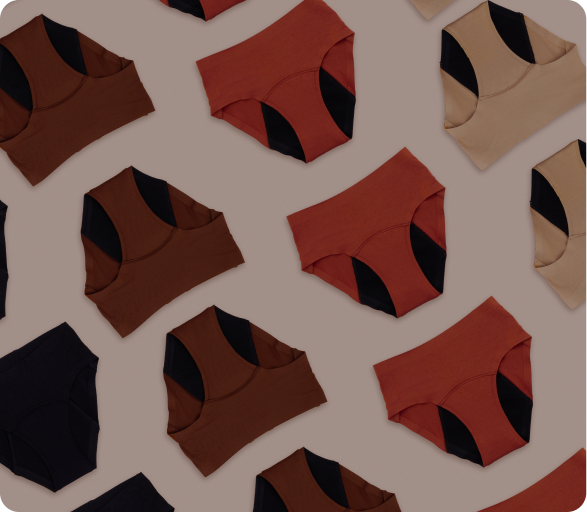It’s a familiar scene: you wake up to find your sheets stained, your pyjamas soaked, and your confidence bruised despite going to bed with what felt like a manageable flow. If you've ever wondered why your period seems to go rogue after dark, you’re not alone. Let's unravel the science, myths, and solutions behind heavy menstrual periods and this nighttime menstrual drama.
The Science Behind Nighttime Menstrual Flow
Gravity And Blood Pooling
During the day, gravity does a lot of quiet work, pulling menstrual blood steadily downward, helping it flow out of your body. But once you lie down, gravity’s help wanes. Blood can begin pooling and collecting in the uterus, especially if your flow is already heavy. The result? When you get up in the morning, that pooled blood is suddenly on the move giving the impression that your heavy menstrual period has doubled overnight.
Hormonal Fluctuations At Night
Hormonal fluctuations and your body’s natural circadian rhythm can affect how the uterus contracts especially at night. Prostaglandins, which trigger these contractions, may be less active during sleep when the body shifts into a rest-and-repair mode. This can slow down menstrual flow while you sleep, often leading to a heavier release when you wake and start moving again.
Since menstrual blood flow may slow or pool slightly while lying down, you might feel a stronger sensation of cramping as the uterus continues to contract to shed its lining. While it’s not proven that the uterus necessarily contracts more forcefully at night, the reduced effect of gravity and increased pain sensitivity during sleep can make cramps feel more intense, especially in the early morning, when heavier flow often follows a change in position.
Is It Normal For My Period To Overflow At Night?
Yes, and no. A bit of nighttime leakage is common but frequent overflow where you soak through a pad, towel, and into the sheets could be a sign of heavy bleeding or even menorrhagia. If you find yourself waking up every few hours to change products or dealing with frequent clots in period blood, it’s worth investigating further.
A few other reasons why some people experience heavier night flow are:
1. Underlying Health Conditions
Conditions such as uterine fibroids (non-cancerous growths in the uterus) can lead to heavy bleeding during periods.
- Polycystic ovary syndrome or PCOS is a hormonal disorder causing irregular periods and a heavy flow.
- Adenomyosis occurs when the uterine lining grows into the muscle wall also resulting in intense bleeding.
- Endometriosis is a condition where uterine-like tissue grows outside the uterus, contributing to a heavy menstrual period.
- At night, when you're lying down for hours, blood can pool in the uterus. Upon standing or changing position, this pooled blood; often thicker and clot-filled due to slower flow, may exit all at once, making nighttime bleeding feel more intense.
2. Medications
Some medications, including blood thinners or hormone therapies, can exacerbate bleeding. Always consult a healthcare provider if you suspect your medication is affecting your cycle.
3. Age and Perimenopause
Hormonal shifts during the late 30s and 40s can result in heavy bleeding, especially at night. This is due to irregular ovulation, which affects the balance of oestrogen and progesterone. When ovulation disrupts, progesterone levels start to drop, while oestrogen continues to stimulate the uterine lining, causing it to thicken more than usual, and leading towards a heavier period.
Smart Strategies For Managing Heavy Flow At Night
1. Try the Foetal Sleeping Position
Your sleeping position during periods can actually impact how you experience your flow. Curling up in a fetal position helps reduce pressure on the abdominal muscles, which can ease cramping and keep the legs closer together to reduce leakage. Plus, it just feels comforting.
2. Use Overnight-Specific Protection
This is where innovation meets necessity. Overnight period panties, also known as night period pants or overnight underwear for periods, are made to hold significantly more fluid than regular pads. With full coverage and leak-proof technology, they’re the MVPs of nighttime period care. Try Mahina’s Period Underwear in Super Heavy and experience the relief yourself!
3. Double Up For Peace Of Mind
If your period likes to defy the rules, double protection might be your answer. Pair a tampon or menstrual cup with an overnight pad or period underwear. You can also place a towel or a bed protector under your sheets; just in case.
4. Heat Therapy (Yes, Even At Night)
Heat therapy for cramps isn’t just for your daytime Netflix binges. A warm water bottle or heating pad can soothe uterine contractions that feel sharper at night, helping you sleep better.
Mahina's Take On Overnight Protection
When it comes to sleeping easy on your period, Mahina’s got your back (and your bed). Our overnight period panties combine high-absorbency design, leak-proof layers, and breathable comfort so you can ditch the towel-under-the-sheets routine for good.
Whether you're dealing with heavy flow or just want peace of mind, Mahina makes you wonder why you didn’t switch sooner. Designed to hug your body where it matters and rigorously tested for 100% leak protection, this is period self-care, redefined.
Sound Sleep, Sound Flow
Periods don’t punch out at bedtime. They keep working the night shift, and so should your period products. By understanding why your flow feels heavier after sundown and by gearing up with smarter solutions, you can finally reclaim those eight hours of rest. Because let’s be honest: cramps, clots, and compromised sleep? We’re over it.

























































